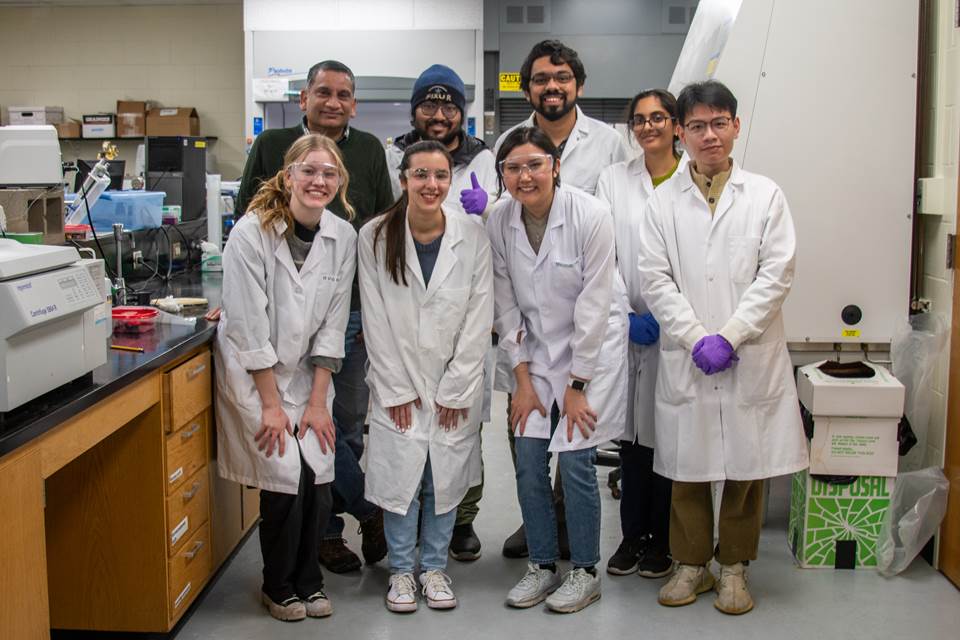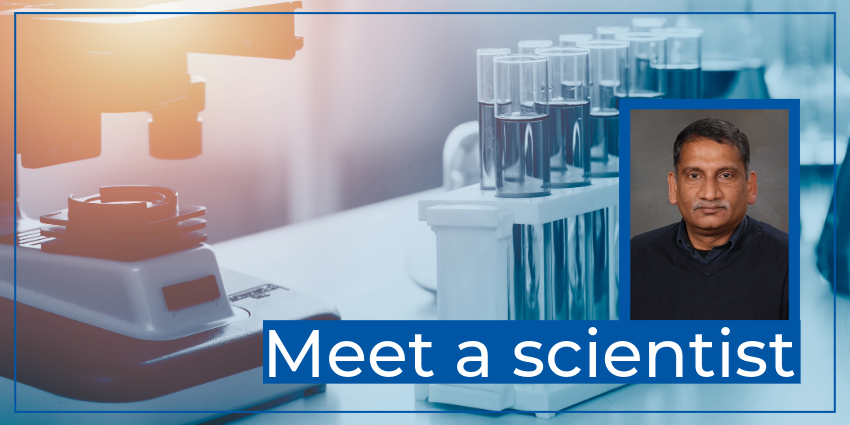Shankar Chellam, Ph.D., will admit that education was not the highest on his priority list growing up.
Not “a dummy in the field,” as he describes himself at cricket, he attended college on an athletic scholarship.
It was there that he found an interest in science that would take his life on paths he had never even thought of, eventually bringing him to Texas A&M University, where he combines his love for research and teaching to study water purification, virus removal and aerosols.
“My career has taken more than its fair share of twists and turns,” said Chellam, now a professor in Texas A&M’s Zachary Department of Civil and Environmental Engineering. “I had no ambitions or aspirations to do a Ph.D. out of my undergraduate degree, but then life did what life does, and then here I am.”
Chellam graduated from Birla Institute of Technology and Science with a bachelor’s in mechanical engineering but felt that his education was not complete.
“Towards the end of my education, I realized that although I learned something, I didn’t really learn as much as I wanted,” Chellam said. “So, I stuck around for a master’s. There was no cricket, my athletic eligibility was over; I really had to learn, and that’s when I got excited about what I was doing in the classroom.”
Learning on the job opens doors
During this time, Chellam took a job as a process engineer at a nearby company to help pay for his education. As part of his role, he was responsible for maintaining wastewater treatment plant equipment.
He grew in confidence as an engineer, learning that he was able to fix issues as they came along. Eventually, he realized that while he enjoyed fixing problems, he wanted to understand how the systems he fixed worked.
“Although I got things done, I realized that that wasn’t satisfying to me,” Chellam said. “I realized that getting things done wasn’t as exciting to me as knowing why things were working the way they were working.”
Chellam graduated with a master’s in chemistry from Birla Institute of Technology and Science but had decided that he was not done with his educational journey. Drawn to wastewater treatment after his work on the mechanical side of it, Chellam decided it was time to go to the United States for more research opportunities.
“I wasn’t fully sold on a Ph.D., I didn’t know what it was, what it needed, what I had to do to earn one,” he said. “So, I applied for the master’s program at Rice University and came from India for the program.”
Once at Rice, Chellam’s master’s project focused on advanced water filtration systems. His advisor was also new to Rice and at the beginning of his career, working on water filtration and water filters. This created the chance for Chellam to get a unique hands-on experience.
“He was brand new, and the equipment still wasn’t there, so I had to assemble and fabricate the apparatus, the pumps and put everything together,” Chellam said.
His three years of work experience in India helped Chellam excel in the research set-up process.
After graduating with a master’s in environmental science and engineering, he decided he was now interested in a doctorate and would continue his academic career at Rice.
“I wanted to do something different for my Ph.D. than I did for my master’s,” Chellam said. “My first year I tried different things, I even wrote a couple of papers. But then I went back to the same filtration technology that I studied for my master’s but with a different spin.”
He obtained a Ph.D. in environmental science and engineering from Rice, then moved with his wife to the East Coast for her postdoctoral studies and took a job as an engineer at a consulting firm.
“The actual job was in the consulting firm in their applied research department,” Chellam said. “My responsibility was to implement these new filters or figure out the possibility of implementing new technologies for water treatment in the East Coast.”
While working there, Chellam got into grant writing for the first time. After receiving a large grant from the U.S. Environmental Protection Agency, his confidence helped push him back toward academia.
Returning to Texas
After making that decision, the next step was figuring out how. Chellam’s familiarity and connections in Houston from his time at Rice helped him land an opportunity at the University of Houston.
“Even now I love U of H; it gave me my first start,” Chellam said. “I liked what I was doing and luckily was successful in teaching, research, everything.”
Chellam spent 14 years at the University of Houston before Texas A&M called, looking to recruit him. Replacing a retiring professor, he decided to try something new and applied for the position.
Inspiring Aggie engineers to reach higher

His move to Texas A&M allowed Chellam to continue his love of teaching and research. As a professor, his interactions with both undergraduate and graduate students mean a lot to him.
“To me it’s not research or teaching, it’s research and teaching,” Chellam said. “I try to combine my research into teaching; they are not two separate parts for me.”
Working with students, his research continues to focus on wastewater and more recently, how it connects with water, the kind that gets used for drinking and more.
“The old way was purifying the wastewater and then dumping it in the bayou, stream or somewhere and not really thinking about it,” Chellam said. “The new way of thinking about water and wastewater is almost like a circular water economy, rather than a one-and-done linear economy.”
This thought process has shifted Chellam’s focus to the reuse of wastewater.
“I’m interested in disease-reduction in water,” he said. “A good portion of my research is on how you can prevent viruses from being transmitted to your water.”
Chellam hopes that if his career path is of any example to students, that it’s to not have a fixed path. Stepping out of comfort zones and being open to trying new things can lead to amazing opportunities, he said.
“Be organic and don’t plan every step of your day’s plans,” Chellam said. “Also think more about the science underlying processes and technologies, rather than just building the next best thing.”
He also encouraged students to pursue advanced degrees so that that engineers can continue solving deeper problems and developing improved systems.
“Engineers just want to make things work,” he explained. “How do I make things work? How do I build a better filter? How do I build a better widget to purify water wastewater better? But that's not what you do in a Ph.D. In a Ph.D. program, you understand why it works. And possibly, once you understand why it works, then you can propose improvements."


